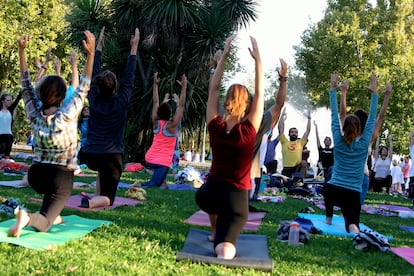Can exercise heal the mind?
Neuroscientist Jennifer Heisz explains the benefits of physical activity on mental health, a link that’s been proven but one that is still not effectively applied

For as long as humans have existed, we have had a different survival mode than other animals – adapting the world to our needs as much as possible rather than conforming to it. This capacity for transformation has made humans a successful species, but progress has come at a cost. The invention of agriculture has led to the emergence of great cities, literature and all the glories of civilization, but it has also drastically reduced food diversity and tied most people to land cultivation. What’s more, in recent decades, accelerating technological progress and sedentary lifestyles have multiplied the rates of obesity and diabetes. Modern life also appears to be causing more mental health problems and sleep disorders.
But according to Jennifer Heisz, a brain health specialist at McMaster University in Ontario, Canada, there is an answer to these problems: exercise. In her recently published book, Move the Body, Heal the Mind, the neurologist explains how physical activity can improve mental health. Her argument is based on her own experience as an exercise convert, as well as scientific research. Heisz, who directs the research institute NeuroFitLab, recounts in her book how exercise – which she came to love at around the age of 40 – helped her while she was going through a separation. It had such a beneficial effect that she decided to redirect the focus of her research to how movement influences the brain.
“My evidence-based, how-to approach will help you enhance your own brain health through exercise,” she says in the book. “You will emerge fully equipped with an exercise skill set to help you achieve greater resiliency, a more positive outlook, sharper focus, enhanced productivity, and more meaningful relationships. Yes, you can have it all!”
Heisz begins by explaining why exercise can be so onerous, particularly at first. For the first time in human history, too much food is more dangerous than too little. The inclination to avoid wasteful expenditures of energy and to take advantage of all available resources have helped humans survive and pass on their genes for hundreds of thousands of years. But in today’s world of abundance and longevity, these tendencies are now posing a problem. An estimated 1.5 million people worldwide die each year from diabetes, a disease that was almost non-existent in pre-industrial societies. An article published in the journal PNAS also put forward the “active grandparent hypothesis” – the idea that physical activity in later years helped to expand human lifespans.

In her book, Heisz argues that exercise is “medicine” and each person must put in the effort that is right for them, without comparing themselves to others. According to data from NeuroFitLab, light exercise such as walking for half an hour three times a week reduces anxiety, and these benefits can grow progressively by increasing the intensity or duration of the sessions. Heisz also makes reference to studies such as a 2018 paper published in The American Journal of Psychiatry, which found that one hour of physical activity a week could prevent up to 12% of cases of depression. It did not, however, find a link between exercise and reduced anxiety.
The director of NeurofitLab also raises the possibility of replacing antidepressants with exercise, at least in some cases. This type of medication has been prescribed with increasing frequency over the last two decades, “especially for mild forms of depression that may not event meet clinical criteria,” says Heisz in the book. According to the researcher, many antidepressants are made on the false assumption that “low serotonin causes all mood disturbances,” meaning they do not work for a significant percentage of people with depression or anxiety. For these mild mood disorders, Heisz believes it is best to assume that a certain level of distress can be overcome without the need for drugs.
Heisz attributes the positive impact of physical activity on mental health to the fact that exercise leads to the production of neuropeptide Y – a neurotransmitter linked to reduced anxiety –, and reduces the chronic inflammation linked to many types of depression. Although past studies have found that exercise can improve anxiety and depression, in some cases even having a greater effect than antidepressants, it has been difficult to show a causal relationship. Doubt was raised about whether a patient was able to overcome a mental health issue thanks to physical activity, or if it was because their condition was not that serious to begin with. But today, new research is providing further evidence for the causal link.
Mental health is a complex issue that is influenced by a wide range of biological and lifestyle factors, meaning it is difficult to assess how a specific person will respond to a particular treatment. According to Heisz, physical activity can improve sleep and focus, and help people break addiction. In these cases, lifestyle factors play a big role: people with mood disorders tend to consume more toxic substances which exacerbates the problem. If integrated into a routine, exercise can provide structure as well as physiological benefits such as reduced chronic inflammation and improved sleep.
According to Rafael Tabarés, a professor of psychiatry at Spain’s University of Valencia, “the evidence that physical activity has a beneficial effect on mental health is very powerful.” He explains: “Whether you exercise by walking in your free time, going to work, or in a more systematic way at a gym, it can be useful for preventing the symptoms of depression or anxiety.” Tabarés also points to studies that show that physical activity can complement pharmacological treatments for depression and reduce the risk of relapse when the treatment comes to an end. “From my point of view, the big problem we have is that, despite the quantity and quality of evidence of the benefit of physical exercise, it is not used with patients,” he says. In his opinion, doctors need time to collaborate with other kinds of medical professionals, “as this type of activity would have to be administered by physical education professionals or physiotherapists.”
Transforming the system into one that not only treats disease but also promotes health requires greater resources and better coordination. It’s a step that could greatly improve health outcomes. Exercise, for example, has already been found to have a positive effect in treating some diseases such as cancer. Alejandro Lucía, a physician and physiology researcher at the European University of Madrid, has observed the benefits of exercise as a complement to chemotherapy in cancer patients, and he believes it would also be useful for mental illnesses. Like Tabarés, Lucía believes that professionals who specialize in this area should be involved with a patient’s treatment. He explains: “Exercise has better results with supervision, particularly in patients who may have greater difficulties, such as those suffering from mental illness.”
Exercise can have a positive effect on the body and mind. But for many, the path to a more active life is not easy and there will be a better chance of success with patience and outside help. As Heisz explains in her book, 40% of people who start exercising stop within three months. Many studies also show that people with depressive or anxiety disorders have a greater tendency to lead sedentary lives.
Move the Body, Heal the Mind has a lot of advice on how to develop an exercise routine. It suggests finding an activity that you enjoy, and one that you can do with other people. It recommends that you go at your own pace and focus on the process, not the end goal. As Tabarés and Lucía note, for people with diagnosed illnesses and who have more difficulty being physically active, change will come when the health system has a more holistic understanding of wellbeing, and incorporates professionals can tap into the positive health effects of exercise.
Tu suscripción se está usando en otro dispositivo
¿Quieres añadir otro usuario a tu suscripción?
Si continúas leyendo en este dispositivo, no se podrá leer en el otro.
FlechaTu suscripción se está usando en otro dispositivo y solo puedes acceder a EL PAÍS desde un dispositivo a la vez.
Si quieres compartir tu cuenta, cambia tu suscripción a la modalidad Premium, así podrás añadir otro usuario. Cada uno accederá con su propia cuenta de email, lo que os permitirá personalizar vuestra experiencia en EL PAÍS.
¿Tienes una suscripción de empresa? Accede aquí para contratar más cuentas.
En el caso de no saber quién está usando tu cuenta, te recomendamos cambiar tu contraseña aquí.
Si decides continuar compartiendo tu cuenta, este mensaje se mostrará en tu dispositivo y en el de la otra persona que está usando tu cuenta de forma indefinida, afectando a tu experiencia de lectura. Puedes consultar aquí los términos y condiciones de la suscripción digital.









































